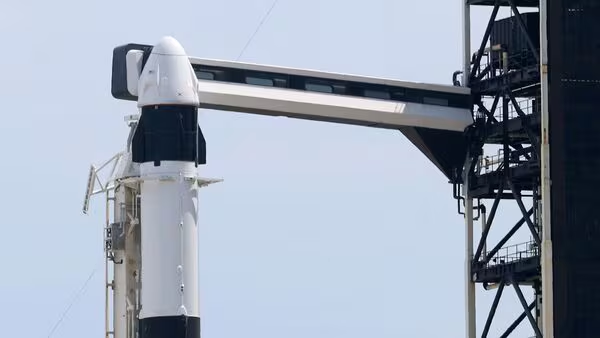In a significant update for India’s space journey, the highly anticipated Axiom-4 (Ax-4) mission—which includes India’s first-ever spacecraft pilot Shubhanshu Shukla—has been postponed following the detection of a liquid oxygen (LOx) leak in the Falcon 9 booster’s forward propulsion stage. The mission, originally scheduled for June 11, 2025, was to launch a four-member international crew to the International Space Station (ISS).
Why Was the Axiom-4 Launch Delayed?
According to ISRO Chairman V Narayanan and technical teams from Axiom Space and SpaceX, the issue was discovered during standard launch checks. Engineers identified a leak in the Falcon 9’s liquid oxygen system and made the call to delay the launch in order to ensure mission safety.
This decision, while disappointing to space enthusiasts worldwide, was essential for the safety of the astronauts and mission success. SpaceX teams are now addressing the issue, and a revised launch date is expected soon.
Meet the Axiom-4 Crew: Global Collaboration in Orbit
The Ax-4 mission is not only historic for India but also marks the first human spaceflight backed by the governments of India, Poland, and Hungary in over four decades. The crew includes:
- Shubhanshu Shukla (India): The first Indian spacecraft pilot
- Peggy Whitson (USA): Veteran astronaut and mission commander
- Slawosz Uznanski-Wisniewski (Poland): European Space Agency astronaut
- Tibor Kapu (Hungary): Hungarian astronaut and biologist
In a charming tradition, the crew also includes a plush swan toy named Joy, which serves as a symbolic zero-gravity indicator.
Shubhanshu Shukla: A New Milestone in Indian Spaceflight
If successful, Shukla will become the first Indian astronaut to pilot a spacecraft—a distinction even Rakesh Sharma did not achieve during his 1984 Soviet-led mission. A former IAF pilot, Shukla’s selection reflects the strengthening ties between India’s space agencies and global private aerospace firms.
His participation in Ax-4 is part of India’s growing space ambitions, coming at a time when the country is investing heavily in both crewed and uncrewed missions.
What Will the Ax-4 Crew Do in Space?
Once launched, the crew will dock with the International Space Station for a scientific mission lasting several days. They plan to conduct over 60 experiments spanning:
- Human physiology in microgravity
- Artificial intelligence systems
- Material science
- Biological growth and stress studies
Seven of these experiments are designed and led by Shukla himself, highlighting India’s growing scientific footprint in international missions.
Safety First: Why Delays Like This Matter
While delays often frustrate viewers and media, they are critical to mission integrity. A LOx leak in the Falcon 9 booster could pose extreme danger during liftoff. Engineers are now working to repair and thoroughly recheck the system before a rescheduled launch.
As Axiom Space stated in a press release, “Ensuring astronaut safety and mission assurance are top priorities.” Shukla and the rest of the Ax-4 crew remain in pre-launch quarantine, continuing to train through simulations, theoretical exercises, and ocean splashdown drills.
What’s Next for Axiom-4?
A new launch date is expected soon, depending on the resolution of the Falcon 9 issue and weather conditions at Kennedy Space Center. If all goes well, Shukla will mark a new era for India in space, joining the ranks of global astronauts participating in commercial, collaborative human spaceflight.
Stay tuned for live launch coverage, crew updates, and technical insights once SpaceX and Axiom provide the all-clear.
Final Thoughts
While the Axiom-4 mission faces a temporary delay, its broader significance remains unchanged. With Shubhanshu Shukla poised to become India’s first spacecraft pilot and lead key scientific experiments in orbit, Ax-4 symbolizes a new frontier in India’s space exploration journey.
🌌 Don’t miss our related story: NASA’s Chandra Spots Fastest Black Hole Jets


